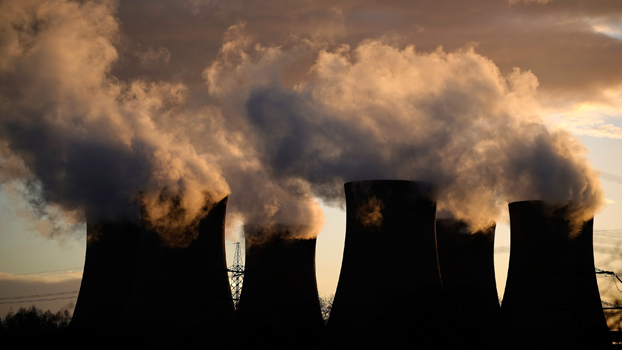Is Boris Johnson serious about climate change?
Getting the UK’s ambitious climate targets into legislation is important, but only Chancellor of the Exchequer Rishi Sunak can m

The climate action shifts to President Joe Biden on Thursday as he attempts to regain U.S. credibility on the topic at a two-day green summit. But as hosts of this year’s COP26 — and as the first country to pledge to get to net zero by 2050 — there’s also a lot at stake for the U.K. It’s no exaggeration to say that “Global Britain,” Prime Minister Boris Johnson’s post-Brexit branding for an outwardly engaged country, stands or falls on what his government says it its “foremost international priority.”
On Wednesday Johnson upped the ante by pledging to cut emissions by 78% by 2035 compared with 1990 levels, adopting the recommendation of the U.K.’s independent Climate Change Committee.
The opposition Labour Party has called for yet “greater ambition.” That misses the point. Nothing is perfect, but Britain’s goals don’t lack aspiration. The “sixth carbon budget,” or CB6, commits the government by law to the fastest fall in greenhouse gas emissions of any major economy. It brings the U.K. more than three-quarters toward its net zero target.
Laudable as that target is, the real test of climate commitment isn’t in the sixth carbon budget. It lies in what Rishi Sunak, Britain’s Chancellor of the Exchequer, does next.
Sunak has made the right noises on climate change, but there was very little in his budget or spending statements so far to suggest it’s more than box-ticking. The chancellor can claim that there was another urgent crisis demanding his focus. But the pandemic can’t delay carbon action.
The Treasury is due shortly to publish its review of the costs of the transition to net zero. How Sunak approaches this — and how the government sets out the details — will tell us much more than this week’s ambitious new target.
Britain’s starting place is both better than many countries and in need of serious improvement. U.K. greenhouse gas emissions have been falling for the past three decades despite rising levels globally. The Climate Change Performance Index places the
U.K. in the top five overall in 2021 and seventh in controlling greenhouse gas emissions.
Legally binding five-year carbon budgets have been part of U.K. policy since 2008. They have cross-party consensus and their legal force provides important signaling to government departments, the public and even the courts. But the U.K. isn’t on track to meet its fourth and fifth carbon budgets and enforcement is unclear at best.
“As historically important as this new target is, it’s meaningless unless there are policies to back it up,” says Ed Matthew, campaigns director at E3G, a climate change think tank. The emissions picture in several sectors, including buildings and transport, has flatlined, he notes.
Many reductions made over the past decade have been paid for by consumers by way of better insulated houses and more efficient appliances. That’s regressive, hitting poorer people harder, but the politics has been felicitous — most people don’t realize they’re paying for an emissions reduction.
The costs are going to become much more obvious. The CCC estimates the U.K. needs to spend about 50 billion pounds ($70 billion) a year for the next three decades to green the economy. A lot of that cost needs to come up front.
Some changes will be easier than others and are being helped by clear government policy, such as the ban on sales of petrol and diesel engines from 2030. There were more than 235,000 electric cars on Britain’s roads as of March; more than 495,000 if you count hybrids. Even so, during 2019, ultra-low emission vehicles made up only 2.7% of new vehicle registrations.
Huge changes are needed in land use, which the CCC estimates will require funding of at least 1.4 billion pounds a year between public and private sector — for supporting things such as low-carbon farming, afforestation and less consumption of carbon-intensive foods. While the pandemic may have altered consumption habits, Britain ranks highly in meat eating.
Low-carbon home heating will also require creative thinking from Sunak. A study for the National Infrastructure Commission estimated that the cost of decarbonizing heat could be as high as 450 billion pounds, with the average household’s cost of heating 100 to 350 pounds higher per year in 2050 than it is now.
And yet the focus on cost distorts the bigger picture. If the U.K. economy grows at the rate the study predicts — about 2.3% annually — heating costs will still comprise a smaller share of overall income by 2050. And the investment in emissions reductions will bring added benefits such as jobs and innovation.
Elsewhere, the current patchwork of tax and regulatory policy built up over decades won’t cut it if Britain’s serious about net zero. For example, if building owners spend on making properties more energy efficient, that increases the rateable value of the property and therefore the tax bill. Buildings make up a large part of the carbon footprint, so Sunak needs to find ways to tackle these tax disincentives and to use fiscal policy to promote investment in decarbonisation. Looking at the size of the challenge and the past record on targets, it’s easy to be skeptical; 2035 is way beyond the lifetime of this government. No country has designed a comprehensive finance plan for net zero. Still, the political consensus and public support is there.
“The Treasury have been the biggest barrier to ambitious climate action,” says Matthew. “This is the moment of truth for Rishi Sunak. Is he really on board for this agenda?” Ready for COP26, or ready to cop out?
Therese Raphael is a columnist for Bloomberg Opinion. She was editorial page editor of the Wall Street Journal Europe.



